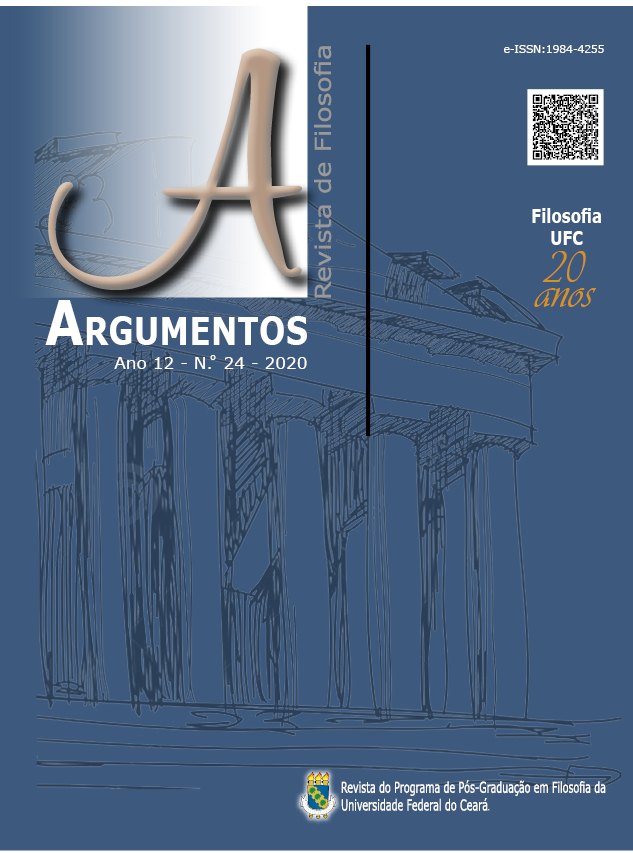Hannah Arendt and the philosophy of existence
DOI:
https://doi.org/10.36517/Argumentos.24.11Keywords:
Existence. Contingency. Plurality. Freedom. World.Abstract
In this article, I develop the argument that Hannah Arendt's thought can be read in the tradition of the philosophy of existence. In order to explain it, I use as a guideline the critic of the theory of identity between Being and Thinking. From this, I highlight elements of this philosophical school that remain and are incorporated by the thinker in her work. Arendt's affiliation with the philosophy of existence helps us to understand the existential roots of central themes in Arendtian political theory, namely: the concepts of contingency, plurality, freedom, and world.
Downloads
References
ARENDT, H. Compreender: Formação, exílio e totalitarismo. São Paulo: Companhia das Letras; Belo Horizonte: Editora UFMG, 2008a.
ARENDT, H. A condição humana. 11ª edição. Rio de Janeiro: Forense Universitária, 2010a.
ARENDT, H. Diario filosófico: 1950-1973. Barcelona: Herder Editorial, 2006.
ARENDT, H. Entre o passado e o futuro. 6ª ed. São Paulo: Perspectiva, 2009.
ARENDT, H. O existencialismo francês. In: ARENDT, H. Compreender: Formação, exílio e totalitarismo. São Paulo: Companhia das Letras; Belo Horizonte: Editora UFMG, 2008a.
ARENDT, H. Homens em tempos sombrios. São Paulo: Companhia das letras, 2008b.
ARENDT, H. O interesse do atual pensamento filosófico europeu pela política. In: ARENDT, H. Compreender: Formação, exílio e totalitarismo. São Paulo: Companhia das Letras; Belo Horizonte: Editora UFMG, 2008a.
ARENDT, H. O que é a filosofia da existência. In: ARENDT, H. Compreender: Formação, exílio e totalitarismo. São Paulo: Companhia das Letras; Belo Horizonte: Editora UFMG, 2008a.
ARENDT, H. SØren Kierkegaard. In: ARENDT, H. Compreender: Formação, exílio e totalitarismo. São Paulo: Companhia das Letras; Belo Horizonte: Editora UFMG, 2008a.
ARENDT, H. A vida do espírito: o pensar, o querer, o julgar. 2ª ed. Rio de Janeiro: Civilização Brasileira, 2010b.
CORREIA, A. “Trágica, não absurda”. In: Princípios: revista de filosofia, Natal, v. 25, n. 48, set.-dez. de 2018, pp. 157-170.
HINCHMAN, L.P.; HINCHMAN, S.K. “Existentialism politicized: Arendt’s debt to Jaspers”. In: Hannah Arendt: Critical Assessments of Leading Political Philosophers – Volume IV – Arendt and Philosophy. New York: Routledge, 2006, pp. 58-86.
KOHLER, L; SANER, H (ed). Hannah Arendt - Karl Jaspers: correspondence, 1926-1969. USA, Harvest Edition, 1993.
NUNES, I.V.B. “In-Between” – o mundo comum entre Hannah Arendt e Karl Jaspers: da existência política ao exemplo moral. Doutorado em Filosofia [Tese]. Unicamp. 2018.
PASSOS, F.A. O conceito de mundo em Hannah Arendt: para uma nova filosofia política. Rio de Janeiro: Lumen Juris, 2014.
VILLA, D. Arendt and Heidegger: the fate of the political. Princeton: Princeton University Press, 1996.
Downloads
Published
Issue
Section
License
Copyright (c) 2020 Argumentos - Revista de Filosofia

This work is licensed under a Creative Commons Attribution 4.0 International License.
Argumentos magazine is licensed under an International Creative Commons Attribution License.
The Magazine uses CC BY inclusion
1) The authors retain the copyright granted to the magazine or the right to initial publication, with the work regularly licensed under the Creative Commons Attribution, which allows the sharing of the work with acknowledgment of authorship and initial publication in this magazine.
2) The authors are authorized to contract additional applicable contracts, for non-exclusive distribution of the version of the work published in this journal (for example, publication in the institutional repository or as a chapter of the book), recognition of authorship and initial publication in this journal.
3) Authors are authorized and encourage to publish and distribute their work online (for example, in institutional repositories or on their personal pages) at any time before or during the editorial process, as they can generate productive changes, as well as increase the impact and reference of published work.




.jpg)










._._3.png)
1.jpg)
._._._.png)
